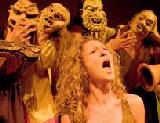SEARCH
REVIEWS
FEATURES
NEWS
Etcetera and
Short Term Listings
LISTINGS
Broadway
Off-Broadway
NYC Restaurants
BOOKS and CDs
OTHER PLACES
Berkshires
London
California
DC
Philadelphia
Elsewhere
QUOTES
On TKTS
PLAYWRIGHTS' ALBUMS
LETTERS TO EDITOR
FILM
LINKS
MISCELLANEOUS
Free Updates
Masthead
Writing for Us
A CurtainUp  London Review
London Review
 London Review
London ReviewMetamorphoses & Elektra
|
The parts of the body and words should correspond closely as if they were joined by strings
---- Plutarch on the ancient art of Cheironomia |

Anna-Helena McLean as Elektra
(Photo: Robert Workman) |
The first half of the production is an adaptation of Apuleius' Metamorphoses or Golden Ass. The only Latin novel to survive in its entirety, the story follows the hero Lucius who goes to Thessaly, a reputed centre of sorcery and black magic. His curiosity lands him an accidental transformation into a donkey. He is then abducted by robbers and made to join in their crimes, until the goddess Isis eventually returns him to human form. It is interesting to note that the author of this tale of witchcraft was himself accused of magic. After marrying a rich widow, her outraged relatives charged him with acquiring her love and thus her wealth by nefariously magical means.
Gardzienice's treatment of this story is an exuberant performance, elliptical yet vibrant. Spoken in Polish, English and Ancient Greek, but with no surtitles, much is unintelligible, and personally I found the ancient Greek parts easiest to grasp. However, for all its incomprehensibility, it is not boring. A performance in all senses of the word, moving tableaux of characters sing in the background and the company variously uses an accordion box, cello, wooden pipes and drums. People peer through a door or from the edge of the stage, with a sense of eager anticipation. In fact, their pretty madcap expression and manic energy enjoys a certain well-orchestrated vigour.
The second portion of the evening is based on Euripides' Electra but presents a version of the myth whereby Electra is raped by her stepfather Aegisthus. This offence, as well as the murder of her father, motivates her revenge. In this way, Gardzienice follows the ancient tragedians, and especially Euripides, who would modify the well-known myths, using the audience's familiarity with the stories to manipulate and subvert expectations.
Gardzienice's Elektra also presents a treatise on Cheironomia, the ancient art of formalised gestures or schemata used to express emotion. This display of esoteric erudition provides the basis for a hectic, dynamic performance. The non-naturalistic gestures are employed with such brilliant energy that Elektra's plight is portrayed with a sort of primitive rawness. For example, at one point, Elektra is in the middle of a crowd of people, physically shoved and battered by them as they recite her story with full complement of gestures. This is a refreshingly spirited incarnation of Greek tragedy, which is so often portrayed on the stage with static dignity.
Gardzienice has rightfully won itself a following of expert aficionados. For people who want to know more about them, The Barbican is also running a series of complementary events: an exhibition of photographs (1-11 February) and two films accompanied by talks (4-5 February). Gardzienice's breathless pace, disregard for certain conventions and sheer energy make this a rare opportunity to see a liberating, if baffling, performance
|
METAMORPHOSES & ELEKTRA
Based on original texts by Lucius Apuleius and Euripides Text adaptation and direction by Wlodzimerz Staniewski With: Mariusz Golaj, Joanna Holcgreber, Marcin Mrowca, Anna-Helena McLean, Grzegorz Podbieglowski, Anna Dabrowska, Agnieszka Mendel, Julia Bui-Ngoc, Aleksandra Gronowska, Alicja Zmigrodzka, Justyna Jary, Barbara Songin, Pawel Kieszko Dramaturgy of music and gestures by Wlodzimerz Staniewski Translation of Elektra: Jacek Dobrowolski Adaptation of ancient songs: Maciej Rychly, Anna-Helena McLean Light Operator: Pawel Kieszko Animation: Daniel Tumanowicz, Rafal Tumanowicz Elektra is co-produced by Der Hebbel am Uffer Theater, Berlin. Supported by the Polish Ministry of Culture Running time: 1 hour 55 minutes with no interval Box Office: 0845 120 7554 Booking to 11th February 2006 Reviewed by Charlotte Loveridge based on 1st February 2006 performance at the Pit, Barbican Centre, Silk Street London EC1 (Tube: Barbican) |





